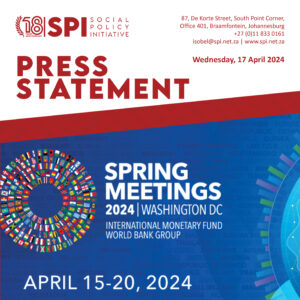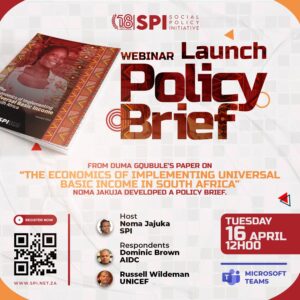
Written by
The Social Policy Initiative (SPI) has welcomed Finance Minister Enoch Godongwana’s commitment to continue paying the Covid-19 Social Relief of Distress (SRD) grants.
However, the feminist research think and do-tank yesterday lamented the amount of R350, saying it fell short of decent income for struggling South Africans.
This comes as the ANC resolved at its elective conference at the weekend that it wanted the R350 social grant to continue as a basic income grant when it lapses in 2024.
In his Medium-Term Budget Speech, Godongwana recently said the SRD grant for adults will not be terminated in future, after it was extended for another year to the end of MarchIn a statement, the SPI said it, and civil society at large, welcomed and celebrated with enthusiasm, and believed that this was a step in the right direction.
“The R350 grant recognises the lack of income support for the millions of unemployed people, and goes some way to meeting basic needs and stimulating local economic activity. Income support can be a life-changing intervention, especially for the youth,” it said.
“However, the amount falls far short from a decent income, and the eligibility criteria for the grant have been challenged legally for their unreasonable demands.”
The SPI is advocating for an unconditional universal monthly grant of R1 335 per for every South African resident, including refugees and registered asylum seekers.
A new report commissioned by the Department of Social Development found that the SRD grant can be adopted permanently, without sacrificing economic growth.
The Expert Panel Report on Basic Income Support (BIS) launched last week used different models to consider the economic, fiscal, and social impacts of making the SRD grant permanent.
Alex van der Heever, the chairperson of panel investigating the feasibility of the BIS, said the report proposed that “a phased approach be adopted for the progressive enhancement of the SRD benefit over time”, in a bid to minimise the impacts of the introduction of new taxes to fund the grant.
“The modelling results show that, depending on how it is financed, the SRD grant can be introduced in a manner which is fiscally and economically sustainable,” Van den Heever said.
“The findings of the models showed that the SRD grant offers significant redistributive opportunities, diminished only by the choice of financing options.”
The Institute for Economic Justice this year conducted a study considering19 financing options for a universal BIG, which would garner between R275 and R355 billion per annum.
The study showed that universality in the BIG was preferable for equity and administrative reasons, with the grant clawed back via the tax system from the wealthier members of society.
Meanwhile, the SPI commended the resourcefulness, dedication, and tenacity of civil society, the labour movement, and political parties in repeatedly raising and sustaining the call for the BIG from the initial recommendations of the 2002 Taylor Committee Report.
However, it said Godongwana’s statement that financing the R350 grant will have to come from cutting other social programmes for the poor is robbing Peter to pay Paul.
“As the recently released report of the Expert Panel on the BIS and other modelling research by SPI and the Institute for Economic Justice, among others, have shown the affordability of a decent BIG through a variety of methods that do not cut other programmes,” it said.
“Additional public spending through social grants will have a highly positive impact by stimulating economic growth and jobs in a period of turgid growth and growing hunger and hopelessness,” the SPI said.
© Independent On-line [2023]. All rights reserved.


